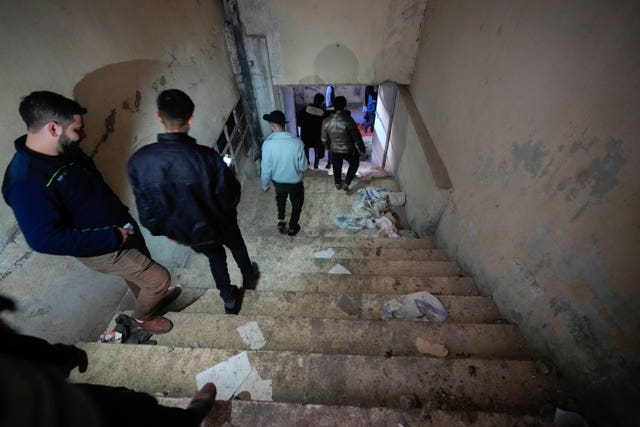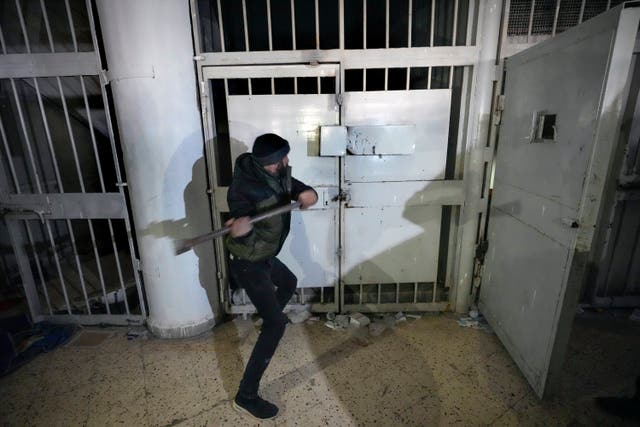Thousands flock to Assad regime prison in search for missing loved ones
The infamous military jail outside Damascus was known as ‘the Slaughterhouse’.

Thousands of people have been flocking from all over Syria to Saydnaya prison outside Damascus in the hope of finding loved ones arrested by Bashar Assad’s regime.
For the past two days, all have been looking for signs of relatives who disappeared years or even decades ago into the secretive, sprawling prison known as “the Slaughterhouse”.
But hope gave way to despair on Monday. People opened the heavy iron doors lining the hallways to find cells inside empty. With sledgehammers, shovels and drills, men pounded holes in floors and walls, looking for what they believed were secret dungeons, or chasing sounds they thought they heard from underground. They found nothing.
Insurgents freed dozens of people from the Saydnaya military prison on Sunday when Damascus fell. Since then, almost no one has been found.

She had rushed from her Damascus home to the prison on the capital’s outskirts, hoping to find her brother. He was detained in 2011, the year that protests first erupted against the former president’s rule – before they turned into a long, gruelling civil war. She did not know why he was arrested.
“My heart has been burned over my brother. For 13 years, I kept looking for him,” she said. When insurgents last week seized Aleppo – her original hometown – at the start of their swiftly victorious offensive, “I prayed that they would reach Damascus just so they can open up this prison,” she said.
Civil defence officials helping in the search were as confused as the families over why no further inmates were being found. It appeared fewer were held here in recent weeks, they said.

During Mr Assad’s rule, and particularly after the 2011 protests began, any hint of dissent could land someone in Saydnaya. Few ever emerged.
In 2017, Amnesty International estimated that 10,000-20,000 people were being held there at the time “from every sector of society.” It said they were effectively slated for “extermination”.
Thousands were killed in frequent mass executions, Amnesty reported, citing testimony from freed prisoners and prison officials.
Prisoners were subjected to constant torture, intense beatings and rape.
Almost daily, guards did rounds of the cells to collect bodies of inmates who had died overnight from injuries, disease or starvation. Some inmates fell into psychosis and starved themselves, the human rights group said.
Five White Helmet teams, with two dog teams, came to Saydnaya to help the search. They even brought in the prison electrician, who had the floor plan, and went through every shaft, vent and sewage opening. So far, there were no answers, Abu al-Dahab said.
He said the civil defence had documents showing more than 3,500 people were in Saydnaya until three months before the fall of Damascus. But the number may have been less by the time the prison was stormed, he said.
“There are other prisons,” he said. “The regime had turned all of Syria into a big prison.” Detainees were held in security agencies, military facilities, government offices and even universities, he added.
Later on Tuesday the United Nations said humanitarian operations in two major areas in northwestern Syria have resumed, deploying food, medical supplies, fuel and other services and supplies.
The OCHA said humanitarian operations in some parts of northwestern Syria were put on hold in the early days of the recent escalation, and resumed on Monday.
“As of yesterday, all humanitarian organisations in Idlib and northern Aleppo have resumed operations,” Mr Laerke told reporters at a UN briefing in Geneva.
He said the three border crossings from Turkey used by the UN to deliver assistance into Syria remain open and “we are providing assistance in the northwest, including to those who have been newly displaced”.
Even before the latest escalation, nearly 17 million people in Syria needed humanitarian assistance. More than one million have been displaced across Idlib, Aleppo, Hama and Homs since the escalation.
Members of the Syrian government under ousted Mr Assad will gradually transfer power to a new transitional cabinet headed by Mohammed al-Bashir.
The departing government met Mr al-Bashir for the first time since Mr Assad fled Damascus over the weekend. Mr al-Bashir had previously led the “salvation government” running the rebel stronghold in northwest Syria.
Mr al-Bashir told reporters after the meeting that the ministers discussed transferring the portfolios to the interim government during the transitional period until the beginning of March.
He said that in the coming days the new government will decide on each ministry.





